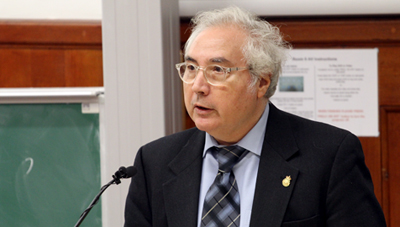Professor Manuel Castells: Communication, Power and the State in the Network Society
Duration: 1 hour 13 mins 32 secs
Share this media item:
Embed this media item:
Embed this media item:
About this item

| Description: |
Lecture 1: Communication, Power and the State in the Network Society
Power in the network society is exercised through networks. There are four different forms of power under these social and technological conditions: 1. Networking Power: the power of the actors and organizations included in the networks that constitute the core of the global network society over human collectives and individuals who are not included in these global networks. 2. Network Power: the power resulting from the standards required to coordinate social interaction in the networks. In this case, power is exercised not by exclusion from the networks but by the imposition of the rules of inclusion. 3. Networked Power: the power of social actors over other social actors in the network. The forms and processes of networked power are specific to each network. 4. Network-making Power: the power to program specific networks according to the interests and values of the programmers, and the power to switch different networks following the strategic alliances between the dominant actors of various networks Counterpower is exercised in the network society by fighting to change the programs of specific networks and by the effort to disrupt the switches that reflect dominant interests and replace them with alternative switches between networks. Actors are humans, but humans are organized in networks. Human networks act on networks via the programming and switching of organizational networks. In the network society, power and counterpower aim fundamentally at influencing the neural networks in the human mind by using mass communication networks and mass self-communication networks. |
|---|
| Created: | 2011-11-21 09:21 |
|---|---|
| Collection: | Humanitas |
| Publisher: | University of Cambridge |
| Copyright: | Glenn Jobson |
| Language: | eng (English) |
| Keywords: | CRASSH; Humanitas; |
| Abstract: | Lecture 1: Communication, Power and the State in the Network Society
Power in the network society is exercised through networks. There are four different forms of power under these social and technological conditions: 1. Networking Power: the power of the actors and organizations included in the networks that constitute the core of the global network society over human collectives and individuals who are not included in these global networks. 2. Network Power: the power resulting from the standards required to coordinate social interaction in the networks. In this case, power is exercised not by exclusion from the networks but by the imposition of the rules of inclusion. 3. Networked Power: the power of social actors over other social actors in the network. The forms and processes of networked power are specific to each network. 4. Network-making Power: the power to program specific networks according to the interests and values of the programmers, and the power to switch different networks following the strategic alliances between the dominant actors of various networks Counterpower is exercised in the network society by fighting to change the programs of specific networks and by the effort to disrupt the switches that reflect dominant interests and replace them with alternative switches between networks. Actors are humans, but humans are organized in networks. Human networks act on networks via the programming and switching of organizational networks. In the network society, power and counterpower aim fundamentally at influencing the neural networks in the human mind by using mass communication networks and mass self-communication networks. |
|---|---|
Available Formats
| Format | Quality | Bitrate | Size | |||
|---|---|---|---|---|---|---|
| MPEG-4 Video | 640x360 | 1.84 Mbits/sec | 1.00 GB | View | Download | |
| WebM | 640x360 | 1.2 Mbits/sec | 659.79 MB | View | Download | |
| Flash Video | 484x272 | 571.94 kbits/sec | 308.03 MB | View | Download | |
| iPod Video | 480x270 | 509.34 kbits/sec | 274.38 MB | View | Download | |
| MP3 | 44100 Hz | 125.01 kbits/sec | 67.14 MB | Listen | Download | |
| Audio Interchange File Format (AIFF) | 1.34 Mbits/sec | 740.25 MB | Listen | Download | ||
| Advanced Audio Coding (AAC) | 44100 Hz | 126.32 kbits/sec | 67.85 MB | Listen | Download | |
| Auto * | (Allows browser to choose a format it supports) | |||||

